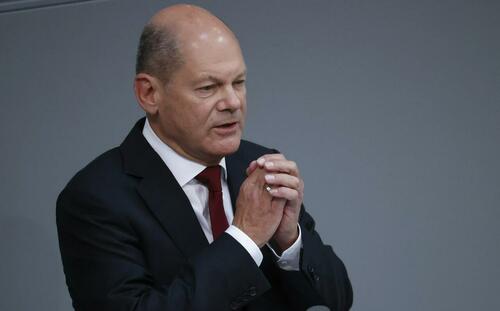“Prices Must Come Down”: Germany Redeploys COVID Cash To Fight Inflation
In the strange ‘upside down’ world of politicians, Germany is joining an array of other nations that have decided the way to ease the pain of (government intervention-enabled) inflation on their citizens is by throwing more money at it.
In order to limit the impact of soaring energy costs – and avoid the social unrest that is now becoming discussed more loudly in the bureaucratic corridors of power in Brussels – Chancellor Olaf Scholz’s administration is preparing to redeploy funds from its COVID preparedness piggybank (which will be added to in order to reach the €200 billion ($194 billion) sum that the government believes is necessary) to put a lid of soaring gas prices.
“Prices must go down,” Scholz said at a press conference in Berlin.
“To reach this goal, we are opening a big umbrella.”
Lowering prices by decree?
This, of course, will do nothing to reduce consumption as winter is coming and shortages loom.
In fact, as OilPrice.com’s Irina Slav reports, Germany’s gas consumption rose too much last week to levels higher than in previous years, and without considerable gas conservation – including from households – Europe’s biggest economy will find it difficult to avoid gas shortages this winter, Germany’s Federal Network Agency, Bundesnetzagentur, said on Thursday.
Starting from today, the agency—the regulator to impose rationing in case of severe shortages—will publish weekly figures about gas consumption in Germany. Last week’s consumption from businesses and households at 483 GWh/week was well above the average seen throughout the 2018 to 2021 period when it was 422 GWh/week. Last week, German gas consumption rose by 14.5 percent compared to the average of the previous years, mostly because that week was colder than comparable weeks in the past four years.
However, the savings needed to avoid gas shortages should be achieved regardless of temperatures, the German regulator said today.
“Without significant savings, also in the private sector, it will be difficult to avoid a gas shortage in the winter,” the agency’s president Klaus Müller said.
The past week’s gas consumption numbers are very sobering, he added.
Germany’s gas storage sites are over 91% full, but the country will survive the winter without rationing and shortages only under three conditions, Müller said.
First, bringing the projects for LNG imports online,
Second, gas supply in Germany’s neighbors remaining stable, and
Third, Germany conserving gas even when it gets colder as winter approaches, he added.
If the coming winter is colder than usual, Germany could see severe nationwide gas shortages, which it will not be able to predict more than two weeks in advance, Müller said earlier this month.
“I can’t give an exact forecast of where the risk of a shortage is the greatest,” Müller told German business daily Handelsblatt in mid-September.
“If we get a very cold winter, we have a problem.“
While little to no details of exactly how this will be achieved have been released, we can’t help but see the ugly reflections of UK’s Truss plan to cap energy bills with an unlimited exposure to the UK balance sheet.
Weimar here we come again?
The irony of all of this is that it comes as German inflation reached double digits for the first time since the euro was introduced more than 20 years ago, surging more than anticipated after temporary government-relief measures ended and Europe’s energy crisis worsened.
Tyler Durden
Thu, 09/29/2022 – 10:35

